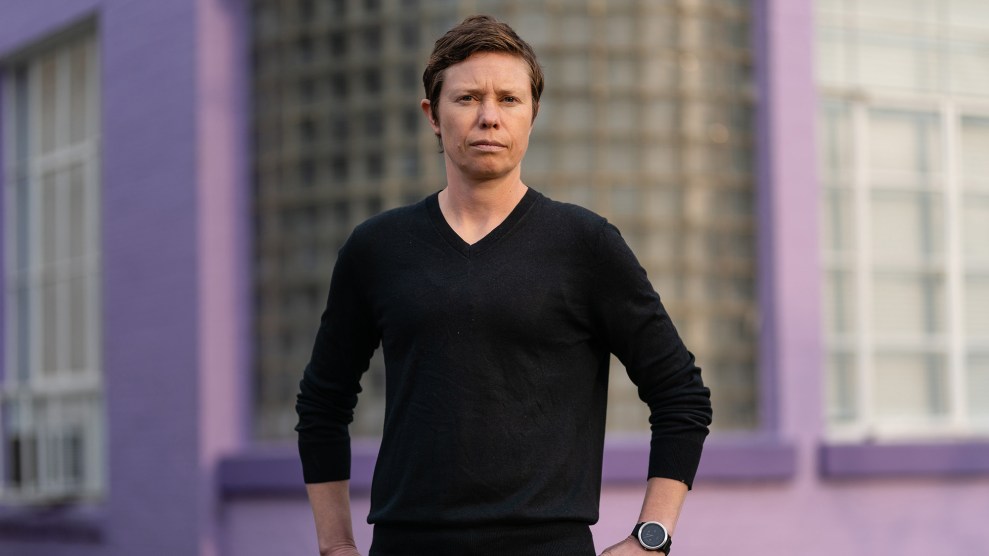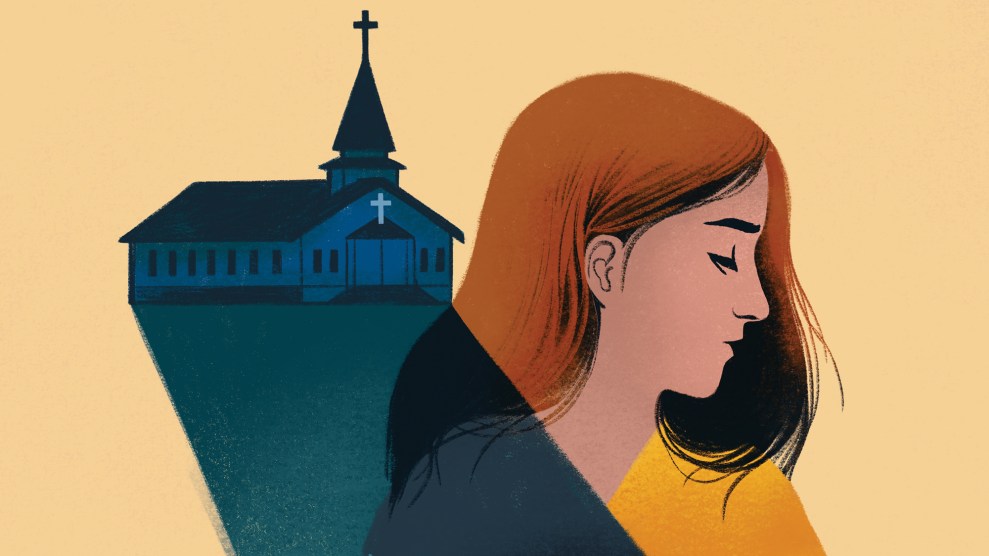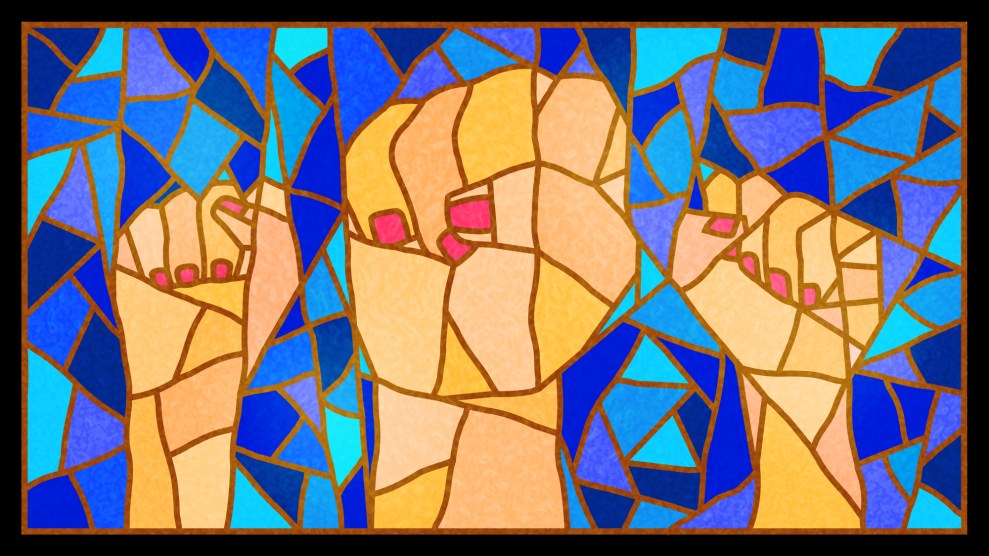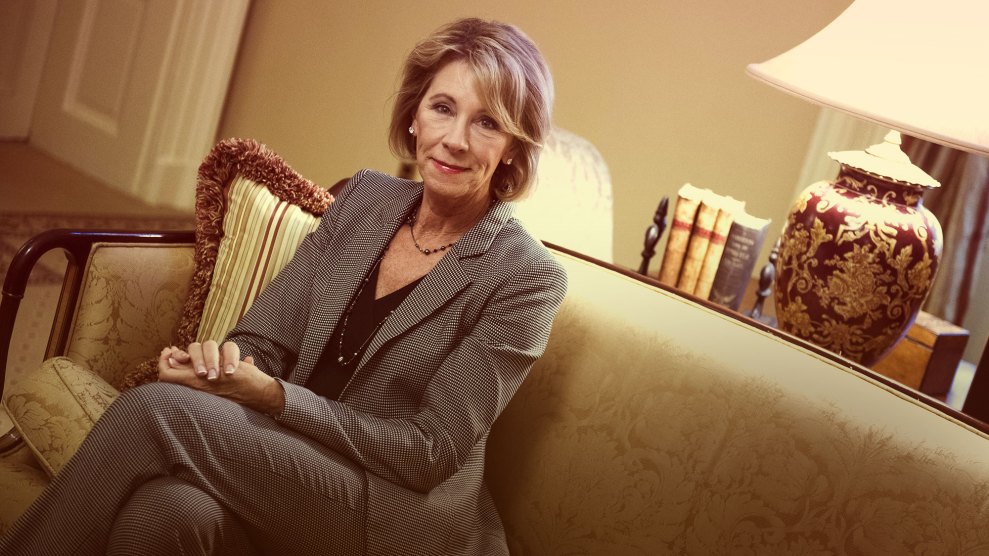There wasn’t a specific moment in which Seth Graves understood himself to be gay, just like there wasn’t a specific moment in which he realized he loved to while away hours reading or in which his adult voice solidified in his adolescent vocal cords. It simply was.
But it was not simple. The son of a Baptist preacher and a devout nurse, he grew up in the western Tennessee delta, and as a high schooler he attended a private Christian academy. He knew that many people around him could not reconcile this part of his identity with their faith, even though when he prayed to that same God, he felt no harsh sting of judgment; in the silence, there was only warmth and peace. He said nothing to his parents about his sexuality, only confiding in a couple close friends.
For more articles read aloud: download the Audm iPhone app.
In the spring of 2016, when it came time to choose a college, his sexuality didn’t factor into the decision; of course, he would attend Union University, a prestigious Christian school in nearby Jackson. It was a familiar place—his mother’s alma mater, he had taken saxophone lessons on campus—and he was offered a significant amount of scholarship money to attend. His best friend was also accepted, and that was that. He’d never had a boyfriend before, so although he knew that the university prohibits “sexually impure relationships” and bans “promotion, advocacy, defense or ongoing practice of a homosexual lifestyle (including same-sex dating behaviors)” in the campus handbook, he didn’t figure he would have a problem. He was there to learn, make some friends, and get his degree.
“It wasn’t like I had intended to deliberately act on what they would call ‘homosexuality’ or ‘homosexual feelings,’” he says in his lightly honeyed Tennessee accent. “So going into freshman year, I had intended to rush a fraternity, I had intended to make as many friends as possible—I wasn’t quite interested in a relationship.”
As it happens, he fell in love.

Union University is a small private Christian liberal arts college that typically enrolls somewhere between 3,000 and 3,500 students. It’s considered something of the crown jewel of Jackson, Tennessee, though the school is somewhat unceremoniously jammed between the 45 bypass that runs straight through the city and a semicircle of shopping centers that have sprung up around it. The campus itself is pristine, if a bit uninspired—the lawns are kept as green as possible, and a red-and-white brick clock tower is the university’s most recognizable landmark, with 49 bells in its top level that mark time in 15-minute increments with the Westminster Quarters.
I grew up about a 20-minute drive from campus in a neighboring county. We had to do most of our shopping in Jackson, and I spent more and more time there in high school to escape the rural morass of my hometown. I equated it with greater freedom—at least, it was as good as it was going to get for me. I hung out mostly in North Jackson, near where Union is, because there was a Walmart to lurk in and plenty of fast-food joints with a dollar menu.
The summer after I graduated high school, I agonized over whether I was making the right decision to move away for college. Union University was the clear answer if I chose to stay near home—I was an evangelical Christian at the time, and Union offered the academic rigor I craved. But a close friend who graduated from Union advised me to move away and figure myself out. When I visit her now, she tells me stories of her time at Union and the university’s continuing devotion to a rigid interpretation of Christianity and the resulting influence on her small city.
In March, when I last saw her, she told me about how a gay man named Alex Duron was set to attend nursing school at Union but his acceptance was revoked when the school learned of his sexuality. How, exactly, Union’s administration found out is unclear; Duron says he never mentioned his fiancé or that he is gay. But in an email to Duron, the university stated, “[Y]our request for graduate housing and your social media profile, including your intent to live with your partner, indicates your unwillingness to abide by the commitment you made,” referring to a values statement Duron signed agreeing to uphold the Christian tenets the university treasures.
When Duron posted the email from Union to his Facebook page in July 2020, the university issued the following response:
“As a Christian institution, Union University has standards of behavior for its faculty, staff, and students that are consistent with biblical teaching and historic, orthodox Christian practice. We love our students and want them to thrive and succeed, and we believe that a standard of conduct that honors God and submits to his authority is an important part of that success. All students who apply to Union University sign a statement saying they will comply with the university’s values. Those students who fail to abide by those values—or who show no intention of attempting to do so—are subject to disciplinary measures that can include dismissal from the university.”
Hearing the details, I was appalled but not surprised. For years, I’ve heard stories of LGBTQ students at Union who had been abused and shamed, many of whom have graduated with significant trauma, in addition to the unfortunately all-too-normal burden of student debt. More than 15 former students spoke to Mother Jones about their experiences at Union, which ranged from fairly benign for those who aren’t gay or remained closeted during their time there to deeply traumatic; all agreed that the campus is extremely hostile to anyone who is not heterosexual.
Many of the people I spoke with are friends of friends, people I could have run into while I was growing up; a couple of them started at Union the same year I would have. While reporting this story, I kept flashing back to a moment in high school when a close friend expressed concern that people would think I was queer because I was friends with some gay kids in marching band. I reacted with outrage, but there was a small part of me that felt more on edge after that—like I had something to hide.

Broadly speaking, over the past few years, there have been arguments over what Christians believe when it comes to gender and sexuality. The United Methodist Church is debating a schism over doctrine recognizing same-sex marriage. The Vatican issued a statement in March forbidding the blessing of same-sex marriages, though some Catholic priests have rebelled, blessing the unions anyway. It’s important to note that in the United States, according to the Public Religion Research Institute, “broad majorities of all major religious groups favor nondiscrimination protection for LBGT people.” Further, 82 percent of white mainline Protestants support such measures, though only 62 percent of white evangelical Protestants do.
Still, Southern Baptists—the largest Protestant denomination in the United States—are firmly in the homosexuality-is-a-sin camp; indeed, they are notoriously ironclad on this aspect of their theology. Union University is affiliated with the Tennessee Baptist Convention, hewing closely to the scriptural and cultural beliefs held by conservative evangelicals. A former president of the Southern Baptist Convention, Steve Gaines, is an alum, along with a handful of former federal judges and state politicians. In the summer of 2017, the Southern Baptist Convention published a statement of faith, penned by a complementarian group called the Council on Biblical Manhood and Womanhood. It became known as the Nashville Statement, signed by more than 150 evangelical leaders, and it reaffirmed their belief that homosexuality and gender identity outside of biology is a sin, and that marriage is a protected covenant between a man and a woman. Four of the signatories were employed by Union—university president Samuel “Dub” Oliver, dean of School of Theology and Missions Nathan Finn, Graves Professor of Moral Philosophy C. Ben Mitchell, and professor of political science Hunter Baker. Gaines also signed it. (Other alumni wrote a letter to the university expressing disappointment: “The Nashville Statement is a declaration of bigotry and condemnation that is a far cry from the faith, hope, love, and acceptance we were taught was the hallmark of the faith of Union University,” they wrote.)
It’s no surprise then that Union explicitly bans homosexuality on campus, as do many other Christian colleges. In doing so, these schools claim legal protection under the religious exemption of Title IX, a federal civil rights law that prohibits discrimination on the basis of sex in education. The carveout essentially allows any private school that is controlled by a religious organization to bypass Title IX requirements that directly conflict with the school’s religious beliefs. But, as with much in the name of religious freedom, the policies have enabled administrators to act with impunity.
The exemption dates back to 1972, when Title IX was originally signed into law by President Richard Nixon, though it’s been amended and clarified over the past few decades. In recent years, former Education Secretary Betsy DeVos’ chaotic commitment to broaden the definition of “religious liberty,” and defang the law as part of that mission, has ensured that the line between private schools’ religious liberty and Title IX has become blurrier. “We saw, under the Trump administration, broad expansions of religious exemptions across so many different areas of federal law, mostly through the regulatory process,” explains Naomi Goldberg, deputy director of the Movement Advancement Project, a nonprofit think tank that researches how policy and equality intersect; she also leads MAP’s LGBT Project. “The problem in this specific example is that there is an exemption around sex for religious educational institutions that allows them to discriminate, even those that receive taxpayer dollars.”
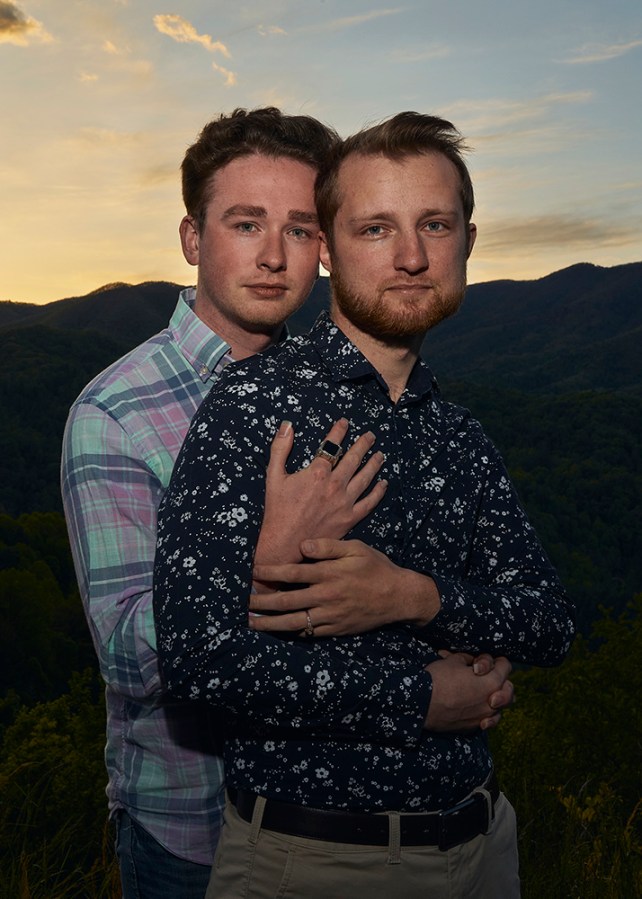
Now, when Seth Graves talks to his parents, his dad says he’s praying for both him and his fiancé.
Stacy Kranitz
DeVos’ team expanded eligibility for the religious exemption so that essentially any school could claim it, even retroactively, without any prior approval process. In practice, this meant that if a student filed a claim with the department’s Office of Civil Rights alleging discrimination, schools could simply respond by claiming the religious exemption without even having to file a waiver and get that protected status from the government in the first place. “It becomes more of a defense, rather than a proactive statement,” Goldberg says. (It’s worth noting that it does not appear that the federal government was exactly holding back on granting exemption status before DeVos’ tenure: Records from the Office of Civil Rights show that between 1975 and 2018, which is the most recent data available on the waiver process, all requests for exemption were approved.)
Now, though, these schools may have to consider a new policy. In March, 24 private Christian colleges, Union University among them, were named in a class-action lawsuit against the Department of Education that targets the religious exemption and challenges the constitutionality of discriminatory policies against LGBTQ students held by universities that accept federal funding through Title IX. Also named in the suit are high-profile schools like Liberty University, Baylor University, and Moody Bible Institute. Regarding the lawsuit, Union University wrote in a statement to Mother Jones: “At Union University, we believe that all persons have inherent dignity and thus should be treated with kindness and respect. We exercise our legally-guaranteed religious freedom in a manner that upholds and reflects this bedrock principle.” It adds, “This dubious lawsuit is an ill-considered effort to erase religious schools by denying financially disadvantaged students the ability to attend the college of their choice. It’s a misguided attempt to discard a congressional enactment consistently respected and enforced by every presidential administration—both Democrat and Republican—for over four decades.” (The school did not respond to follow-up questions regarding individual incidents.)
At the helm of the lawsuit, Elizabeth Hunter, et al. v. U.S. Department of Education, which includes Duron and another Union alum, Scott McSwain, as plaintiffs, is Paul Southwick; he knows from experience what it’s like to live on a campus devoted to “religious freedom.” Southwick graduated from George Fox University, a Christian college in Newberg, Oregon, in 2005. “The sad reality is that it’s better on the other side—once you’re out of these kinds of institutions, the world is a much more welcoming place than it was when I was in college,” he says. “But these colleges themselves, they’re kind of like these little fortresses of LGBT oppression.” While at George Fox, the administration sent him to conversion therapy for two years, and he experienced panic attacks so severe that he was hospitalized. “It was one of the worst periods of my life,” he says. “I am motivated because I don’t want any other young people to go through what I went through.”
And, of course, the damage doesn’t end at graduation—many former students I spoke with continue to struggle with the aftershocks of spending some of their most formative years hiding from everyone around them. “I’m several years out of that kind of environment, it’s easy for me to intellectually say, ‘I don’t believe this anymore,’ or ‘This is not true,’ but it still kind of resides in your body a little bit,” says Josh Garcia, a Union alumnus who graduated in 2012. “You have these, I guess, trauma responses to different things.”
“When I’m in new environments, where I’m not with people that I’m comfortable with,” he adds, “I can be afraid to speak and afraid to move, because of what that might signal to other people, even though I mostly move in safe environments.”

Graves met his boyfriend in August 2016, just as the semester was starting and they were both rushing a fraternity.
For the next six months, Graves was just another college student in love for the first time. He’s a self-described romantic, and the school’s rules seemed like a common trope that comes up in great works of literature, a formidable obstacle for love to overcome. The relationship was also a step, Graves says, toward accepting and loving himself. “At the point where I decided to really allow myself to feel this emotion was the first time that I was telling myself that it was actually okay for me to feel that thing, that forbidden love that I’ve always been taught my entire life was something to be avoided, something to be shunned,” he recalls. “Falling in love with him was scary, to say the least. [But] it kind of felt like falling into place—I felt like me for the first time.”
They kept their relationship quiet, sharing it only with a couple of other gay students on campus, climbing through each other’s windows at night, and going on dates outside of Jackson, where there was less of a risk that they would be recognized and outed. Suspicions arose anyway.
Over time, Graves found that his secret was overwhelming, and not being able to share his happiness with the people he loved the most made him feel boxed in. It was also the kind of love that emboldens and makes the subject feel invincible and full of unique possibilities. Finally, he decided to hope for the best and come out to his parents.
They were horrified. They cut him off from their financial support, only allowing him to keep his cellphone and car in case of an emergency. “I came from a rather affluent background. I never had to take care of anything for myself, it was always done for me, by my mom in particular,” he says. Suddenly, he was on his own, juggling the stress of paying an avalanche of new bills alongside his academic load and his sexual identity.
Not long after, Graves’ relationship imploded. The pressure to keep passing as straight had gotten to be too much, and they broke up.
Then, he got a message—the dean of student life wanted to see him.

It’s not as if it’s a secret that Union University is a tough place to survive if you happen to identify as anything other than conservative and heterosexual. Those qualities are, explicitly or implicitly, part of the very fabric of the school’s culture. W, who asked to only be identified by their first initial, recalls an instance in which a professor claimed in class that gay couples were responsible for the fraying morality of society, going as far as to liken LGBTQ people to members of the Ku Klux Klan “because they both require people to accept them and their beliefs as truth, and they don’t accept any criticism of that.” Another former student, Whitney Rio-Ross, recalls an ethics professor describing homosexuality as “a cancer of the soul.” Then there were the many speakers who came through campus to talk about “biblical manhood and womanhood.” She adds, “It was made clear how you were supposed to be acting, and ways that especially men shouldn’t be acting.”
“There were all these little fears of like, ‘How am I presenting myself? How am I moving my body? How am I speaking?’” Garcia says. “[I was] working all the time to self-police and monitor any cues that [I] might give off to indicate that I was gay.”
Several alumni mentioned an incident in which a social justice group known as Soulforce came to campus; the group aims to end political and religious stigma toward the gay community through activism and conversation. The stop at Union was part of its Equality Ride project, which hoped to foster engagement with students on Christian campuses. Union alumni remember being instructed to not speak with any of the Soulforce representatives for any reason. “Before they came, we all received emails and written letters—the whole student body—that we were not to speak to them, that they were allotted this particular spot on campus where they were given permission to park, and we were not, under any circumstances, to go talk with them,” says Garcia. “They were very much pariahs that were exiled to this place we weren’t allowed.” Brent Parrish, another alum, suspects his personal life was investigated by Union because he broke the rules and spoke with Soulforce representatives. (The investigation was never completed because a tornado hit the campus in early 2008.)
When I talked to Yaz Mendez Nuñez, co-executive director at Soulforce, they told me that Union’s policies are far from unique. “[Private Christian colleges] have to play the game, and that is a right-wing conservative agenda,” Nuñez says. “It freezes and consolidates the people of that institution around this idea of what Christianity is supposed to look like that is based off of a Christianity that belongs to a white supremacist, patriarchal slaveocracy. It’s not this authentic, sincere expression of faith.”
This all speaks to a deeply embedded notion, on evangelical campuses and in evangelical culture broadly, of “accountability,” in which brothers and sisters in Christ hold each other to a Christlike standard. But sometimes the good intention crumbles into a mob mentality and a motivation for snitching. I encountered this within my own evangelical experience, particularly when I belonged to a college ministry, Cru, formerly known as Campus Crusade for Christ. When I was in the process of leaving the church—shattered by the death of a friend and tired of trying to reconcile my religion with my conviction that my gender did not make me lesser than a man and that my gay friends were not evil vectors of sin—the Defense of Marriage Act was overturned. I posted on Facebook in support of the decision. It started with a single response, which I rolled my eyes at, and then more and more comments flooded in, creating a nasty fight between the two worlds I straddled. Soon I was bombarded with messages and phone calls from my brothers and sisters, most of whom I knew from Cru, who came armed with Bible passages and theology to demonstrate why my wish for people who love each other to be able to marry was deeply errant. As the arguments escalated, I was in tears, my body convulsed with anxiety. The messages flooding my phone crested, as the network of Christians I was part of began to coalesce around my blasphemy.
Many of the people who spoke with me for this story explained how on Union’s campus, accountability translated to surveillance. After Parrish came out to one of his fraternity brothers, that brother had a panic attack. When Parrish was confronted by the administration about his sexuality—which happened shortly after he was seen talking with a Soulforce member—he wondered if his fraternity brother, overcome with that deep-rooted feeling of responsibility, had narced. “It’s almost a form of PTSD,” Parrish says now, “constantly living under suspicion and always looking behind yourself.”
Scott McSwain, the other plaintiff in the suit with a Union University connection, was put through conversion therapy after a classmate—he doesn’t know who—reported his “homosexuality” to the university in fall 2009. The dean of students called McSwain into her office, where the lights had been dimmed, and tearfully told him that the university was concerned for his soul. Then, he was told he had a choice: He could leave Union, or he could go to “eight free corrective therapy sessions” funded by the school, which were meant to help him address his “sin.”
Union required that the therapy be done by an Exodus International-approved therapist. Exodus International was a leader in Christian conversion therapy at the time, maintaining that men and women could change their sexuality through prayer and psychotherapy—until 2012, when the group’s president, Alan Chambers, wrote a letter apologizing for the trauma the group’s work had caused and closed down the organization. There were no Exodus affiliates that year in Jackson, so McSwain traveled a couple of hours west to Memphis sometimes, a couple of hours east to Nashville other times, to complete the sessions, during which he was required to memorize lengthy Scripture passages and talk about times in which he felt sexually aroused. “People go to therapy to kind of stop hating themselves. I was going to therapy and learning how to hate myself,” he says. And yet, he continued the therapy after the eight sessions, at Union’s behest, but had to pay for it out of pocket.
McSwain also had to download software that would track his internet history on his laptop and his phone and report it to the office of the dean of students, where he was required to attend weekly “accountability meetings.” McSwain passed handwritten notes to his boyfriend on campus to arrange times for them to meet, worried that the administration could see their texts. And every time he logged onto his laptop, he felt he had to evaluate the threat: What could be perceived as sexual, or feminine, or unnatural? He began to have panic attacks for fear something innocuous in his browser history could be interpreted as damning evidence of his sexuality, or that his boyfriend, who was a student at Union as well and eventually became his husband, would be found out—or something else could happen to him as punishment for his very existence.
Something else did happen. One of his “therapists” told him that part of the healing process was fostering “normal” relationships and social interactions with other men. So when it was suggested that McSwain go to a movie with the therapist as part of his treatment, he didn’t think much of it. That is, until the man reached over and groped McSwain’s crotch in the darkened theater. (McSwain’s allegations also appear in the lawsuit.) He says he went to the dean of students and told her what had happened and threatened to go public with his experience. That was the end of the administration’s involvement in McSwain’s personal life.
Still, McSwain suffered severe anxiety and depression from the experience, and nearly took his own life one night when the pain seemed inescapable. “Union pushed me to the point of putting a whole bottle of Xanax in my hand, putting it in my mouth,” he sobbed. “I almost ended everything.”

Graves tells me he remembers signing a values statement after he was accepted to Union—it was among the paperwork that comes with enrolling in the university. It’s sometimes also referred to as the morality clause. In its current form, in a section titled “Worth of the Individual,” sexually impure relationships are prohibited, which “include but are not limited to participation in or appearance of engaging in premarital sex, extramarital sex, homosexual activities, or cohabitation.”
A signature is required at an age when very few people know precisely who they are and what they want. “Imagine this: You’re an 18-year-old student whose family just took out an obscene amount of loans for you to be able to study at Union University. You might be the first-generation or second-generation student,” McSwain says. “You’re sitting right there on the first day of your education, and then you’re handed this contract that says, ‘By the way, if you do these things, you’re out. Do you want to sign it?’ Does that feel like a choice?”
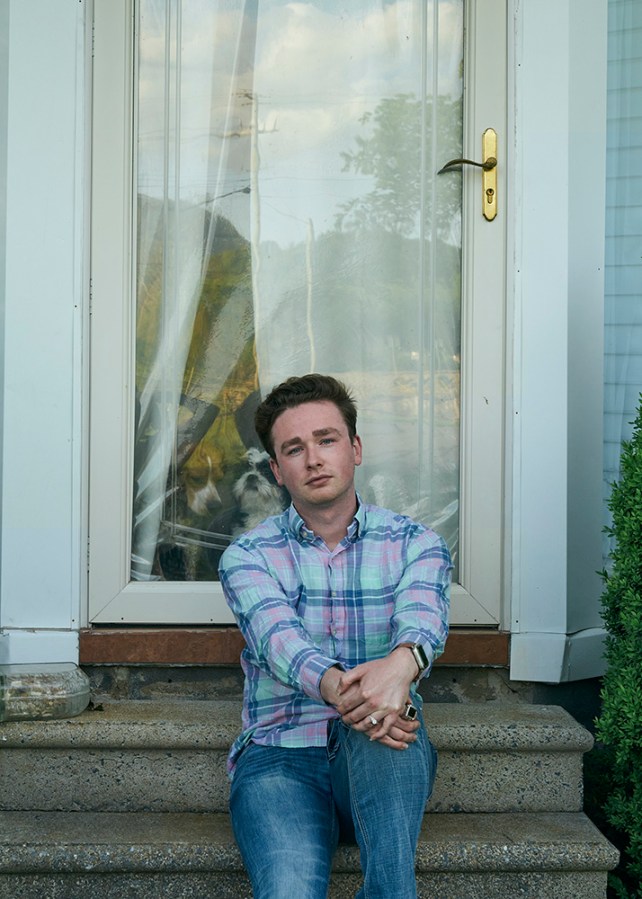
When Graves’ “homosexual activities” were discovered, he was reminded of his signature on the values statement. He was told he would be held to account. In a disciplinary meeting that took place in the office of director of residence life and dean of student life Ken Litscher, surrounded by family photos that proudly proclaimed his “traditional” lifestyle, Litscher told Graves that he was “poisoning the good fruit of the individuals attending university that wanted to become more Christlike.”
Like McSwain, Graves endured invasive questions about his sexuality and navigated wheedling requests to “denounce” his former relationship. Many of Graves’ friends were called in to Litscher’s office, and they too were subjected to probing questions about their own sexuality. One of them, who asked to not be named in this article, told me that “literally nowhere on campus was safe”—he was barraged by suicidal thoughts at the time, and when he began to open up to a professor who seemed worried about him, she quickly stopped him saying, “Don’t tell me anything I’m going to have to report.”
Graves, intimidated and overwhelmed, bowed to the administration’s demands; he had nowhere else to go. He was required to attend counseling, though he found the counselor to be sympathetic. When the counselor asked Graves if he had any desire to change, he answered simply “no” and, thankfully, the rest of the sessions were dedicated to examining Graves’ familial problems and working through ways he could try to move forward. Still, Graves says he was “miserable”—his grades suffered, he was constantly worried about paying his bills, he was afraid to join in class discussion. “Even in my classes, the professors that were teaching me in the political science department were hostile to any view that was not conservative,” he says. “My teachers were teaching their politics…I found myself simply dreading being subjected to those views…I found that I had this unconscious dread about going to class, about participating in discussions. I felt judged constantly, and I felt like I had an opinion to offer that just wasn’t accepted.”
In the fall, Graves was once again called before the administration. He had started a new relationship not long before, a way to try to take his mind off his old flame and his current situation, and he had posted a picture of himself with his boyfriend to his private Instagram. Someone reported it, and Graves was asked, again, to renounce his sexuality or leave the school. “[Litscher] had a very serious conversation with me about what my intentions were at the university,” Graves recalls. “I would have had to prove that I aligned myself with their opinion of what Christian values were, or I had to leave.”
He chose to leave.
“I hate to keep using the word ‘Christian-centric,’ but it was core to the way people thought there, core to how they made decisions, even among their friend groups, like anything that wasn’t that was frowned upon,” Graves tells me. “It was so pervasive that it’s hard to describe unless you really experience it—it’s almost cultlike.”
Now, Graves is 23 years old and he lives with his fiancé at the other end of the state. After leaving Union, he took classes at East Tennessee State University for a while, but even on a public-school campus, he could not shake the feeling that he might do or say something wrong at any moment and his world might come crashing down. “Classes at ETSU are much more liberal-minded and open-minded, even towards a conservative point of view, but I found that there was always a voice inside of me that was like, ‘Hey, you’re not desired, your opinion’s not wanted, you’re wrong,’” he says. “I have an inner dialogue that I have to fight daily, given to me from these people that simply are not open to accepting that who I am is not something to be despised.”
He’s had some odd jobs through the years, working at the local YMCA and Lowe’s, and now he drives for DoorDash. His fiancé’s grandmother recently had a series of surgeries, and the flexibility allows him to care for her as she recovers. He’s also on better terms with his parents; when he calls home, his dad asks about his fiancé, and tells Graves that he’s praying for them both. He’s hoping to start working toward a business degree in the fall.
Toward the end of our first conversation last month, Graves mentions that he had weighed the possibility of suing Union University, since he felt the way he was treated was a Title IX violation. I realized then that he didn’t know about the current class-action suit. When I told him there was a lawsuit that had been filed on precisely those grounds, he was relieved. Not long after we hung up, he texted me: He wanted to see the filing. “If we can make these schools come into compliance with all the regulations regarding sexual orientation, gender, identity, all of those things, it will change dramatically for not just Union, but every school where this persecution exists,” he told me after he read it. “It is comforting to know that people are fighting for this specific cause.”
When I told Southwick, the lawyer, about Graves’ reaction, he was moved. “Since we filed the lawsuit, we’ve received over 100 messages from current students and former students saying, ‘Me too, this was my experience,'” he says. “So we know that we’ve struck a chord and that there’s a large population who has been silently suffering for a long time and feels now that they have the power to speak up because there are so many.”
Now, with his life at Union behind him, Graves isn’t really sure what he believes. “I honestly do not think what they perceive as Christianity is true Christianity, because I respect a lot of true Christians and their beliefs, and I definitely respect the teachings of Jesus Christ, but mankind—in particular, Union’s teaching of what that is—is very different from what I perceive to be the teachings of Jesus,” he tells me. Still, he still finds solace in language and literature. He reads and writes to sift through the complications of his life and examine them more thoroughly. His favorite literary quote comes from Victor Hugo: “To love another person is to see the face of God.”

